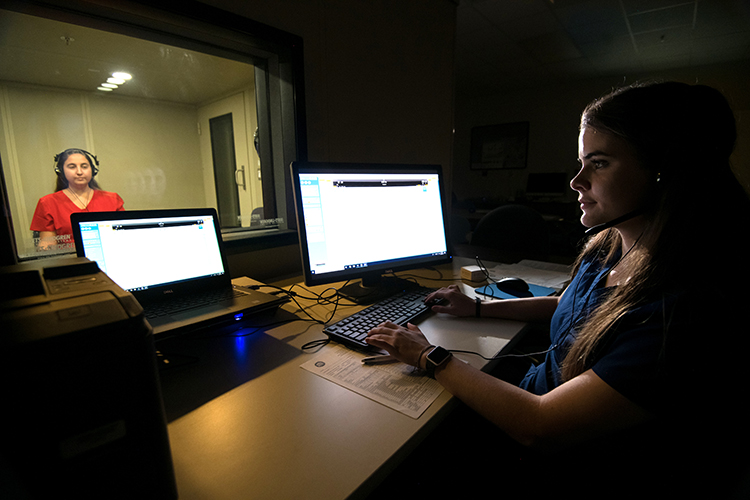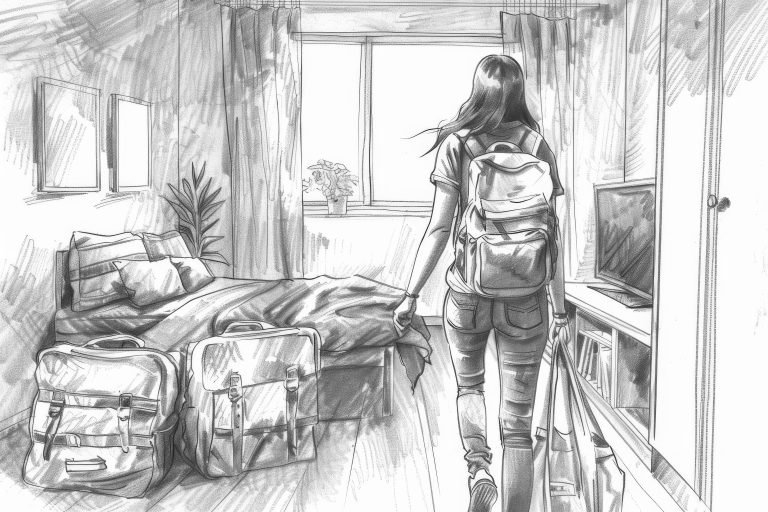
Madison Dacus (right), a senior communication sciences and disorders major at the University of Mississippi, practices conducting a hearing evaluation with Anna Williams Cochran, a graduate student in the program, at the university's Speech and Hearing Clinic. Audiologists recommend that everyone take steps to protect their hearing and go for an evaluation if they notice changes in their hearing. Photo by Kevin Bain/Ole Miss Digital Imaging Services
University of Mississippi audiologists advise everyone to avoid loud sounds, get hearing checked if changes are noted
Faculty and staff in the University of Mississippi‘s Department of Communication Sciences and Disorders encourage everyone to take steps to ensure their hearing health as part of the observance of National Audiology Awareness Month, which falls in October.
Statistics compiled by the National Institutes of Health’s National Institute on Deafness and Other Communication Disorders indicate that about 28.8 million Americans could benefit from the use of hearing aids. And while age is often cited as a factor, growing numbers of younger people are reporting hearing difficulties.
UPDATE (NOV. 21, 2023):
Comparatively, this recent piece from the National Council on Aging (NCOA) features updated data points for measuring hearing loss by:
- Severity and prevalence (including by global region)
- Age and gender
- State level (U.S.) and income level (global)
Untreated hearing loss also can contribute to a range of physical and mental ailments, ranging from feelings of isolation to an increased risk of mental decline.
“People are often concerned about health but they may not think much about hearing health, which is connected to cognitive and mental well-being” said Vishakha Rawool, UM chair and professor of communication sciences and disorders and author “Hearing Conservation in Occupational, Recreational, Educational and Home Settings” (Thieme, 2011).
A 2017 study published by the Lancet Commission on Dementia Prevention, Intervention, and Care cited nine risk factors for dementia, including untreated hearing loss in midlife. The report also warned that dementia typically starts many years before it is recognized and that untreated hearing loss can impact the brain and cognitive health.
Another link has been discovered between untreated hearing loss and falls. According to a study conducted by Johns Hopkins University School of Medicine, an increase in hearing loss – for instance, going from normal hearing to an untreated mild hearing loss – is associated with a three-fold increase in fall risk for older people.
One of the factors in maintaining healthy hearing is being conscious of the degree and amount of loud sound exposure. More than 40 million Americans, aged 20 to 69, have some type of hearing loss, with approximately 10 million of those cases attributable to noise-induced hearing loss.
Managing sound exposure can protect hearing, audiologists advise. Many hearing losses are caused by damage to the tiny sensory receptors, or hair cells, in the inner ear. The damage can be caused by too much noise, and it is permanent; however, steps can be taken to prevent this damage.
The simplest way to protect hearing if one can’t avoid loud sounds is to wear hearing protection. An audiologist can help identify the right hearing protection for a situation, including custom hearing protection that can provide a comfortable fit and good sound quality.
“An audiologist educates patients about safe versus unsafe levels for listening,” said Anne Williams, an audiologist at the UM Speech and Hearing Clinic, operated by the Department of Communication Sciences and Disorders. “They utilize tools and share resources that empower patients to protect their hearing.
“Additionally, they perform hearing evaluations and facilitate aural rehabilitation efforts for hearing loss, tinnitus and certain balance problems.”
The American Academy of Audiology warns that lengthy or repeated exposure to noise above 85 decibels can damage hearing.
To put that into perspective, noise from fireworks can reach up to 155 decibels. A jet plane taking off is estimated to be 150 decibels. Shooting a gun is around 140-175 decibels, depending on the gun. An amplified music concert and an MP3 player with the volume turned all the way up can be 120 decibels or higher.
Outdoor sounds also can pose a risk. Lawnmowers are around 85 decibels and chainsaws can be 115-120 decibels. Compare these with normal conversation, which averages 60-65 decibels.
The academy advises that four main ways to protect hearing can be remembered easily as:
- E – earplugs
- A – avoid loud sounds
- R – reduce the level of sounds
- S – shorten time in loud environments
“Anyone suspecting that his or her hearing has diminished should see an audiologist and get tested as soon as possible,” said Haley Messersmith, another audiologist at the university’s Speech and Hearing Clinic.





We should really all be aware of what noise can do to our hearing. Just like how we protect our other senses, we should also focus on protecting our hearing. The simple act of wearing earplugs would help a lot. I know because I’ve been wearing custom filtered earplugs made by Big Ear for more than 10 years. Well, it’s not important what kind of earplugs you use…even foamies work.